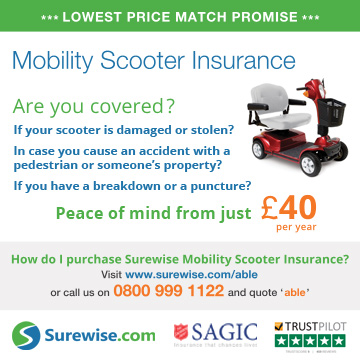Mobility equipment can cost hundreds – thousands – of pounds, so shouldn’t you insure against the worst that could happen?
Accidents happen. Equipment, no matter how well designed and maintained, can break down when it’s least expected. And sadly, disabled people are by no means immune from the attention of thieves. Given the cost of mobility equipment – even when it’s effectively on loan from the NHS or Motability – have you thought about insuring against the worst that can happen?
Wheelchairs
If you’ve received your wheelchair through the NHS Wheelchair Service then you’re automatically covered for damage to the chair and maintenance costs which are covered by the NHS – unless, that is, you live in England and have chosen the Wheelchair Voucher Scheme’s “Independence” option where you take on those responsibilities. As for insurance against theft, fire or more significant damage, it’s possible you could add the wheelchair to your existing home contents policy, even though you don’t actually own it. Alternatively, there are plenty of companies out there which now offer appropriate policies. It’s generally recommended that you get at least public liability insurance covering accidental damage to property and other people. Check with staff at your local NHS Wheelchair Service Centre which can advise you on the most appropriate options open to you.
If you’ve opted to buy your wheelchair privately, it’s even more important to ensure you are covered for theft and damage, as well as general repairs and maintenance. Most manufacturers offer their own deals, but it’s worth checking with several providers – including your own home contents insurance – to see which offers the most cost-effective choice.
Powered chairs and Scooters
If you hire or buy a powered wheelchair or scooter through the Motability Scheme, then don’t worry – insurance is included as part of the deal, although only the contract hire option also includes an extended warranty, servicing and repairs, breakdown cover, and tyres and batteries.
If you opt for the hire purchase scheme you’re automatically insured for the duration of the payment period – which is, on average, three years – though you’ll need to organise servicing and breakdown cover yourself. At the end of agreement, as the proud owner of your powered wheelchair or scooter, you’ll also need to organise insurance, although this can continue to be done through Motability and its chosen insurance partner Royal & SunAlliance.
If you’ve chosen to buy a powered chair or scooter privately, you are under no legal obligation to take out insurance, whether you have a Class 2 (pavement use only, maximum speed 4mph) or Class 3 (pavement and road use, maximum speed 8mph). Organisations such as Help the Aged and the Disabled Living Foundation do, however, recommend that you have at least public liability insurance covering accidental damage to other people and property – even a small accident can result in potential costs running into four figures! Policies can also cover additional losses from fire, theft and damage and include a breakdown recovery service. As with wheelchairs, you can add a powered wheelchair or scooter to some home contents policies; alternatively, you can arrange it separately through the manufacturer or an independent insurance brokers.
